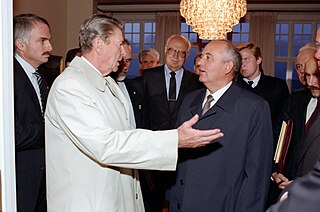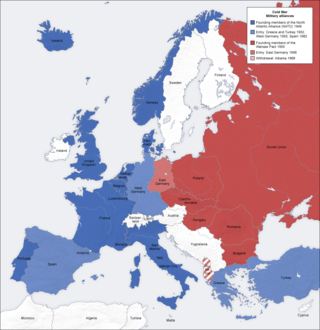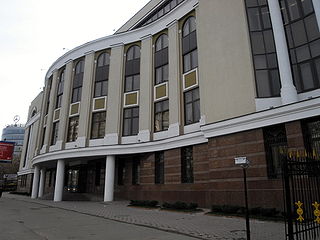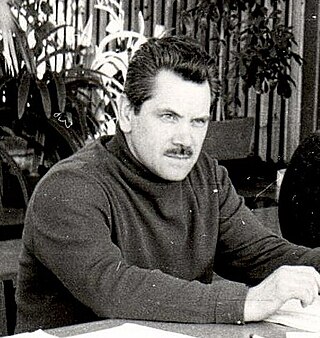Related Research Articles
The history of the Soviet Union from 1982 through 1991 spans the period from the Soviet leader Leonid Brezhnev's death until the dissolution of the Soviet Union. Due to the years of Soviet military buildup at the expense of domestic development, and complex systemic problems in the command economy, Soviet output stagnated. Failed attempts at reform, a standstill economy, and the success of the proxies of the United States against the Soviet Union's forces in the war in Afghanistan led to a general feeling of discontent, especially in the Soviet-occupied Baltic countries and Eastern Europe.

Finlandization is the process by which one powerful country makes a smaller neighboring country refrain from opposing the former's foreign policy rules, while allowing it to keep its nominal independence and its own political system. The term means "to become like Finland", referring to the influence of the Soviet Union on Finland's policies during the Cold War.

Perestroika was a political reform movement within the Communist Party of the Soviet Union (CPSU) during the late 1980s, widely associated with CPSU general secretary Mikhail Gorbachev and his glasnost policy reform. The literal meaning of perestroika is "restructuring", referring to the restructuring of the political economy of the Soviet Union, in an attempt to end the Era of Stagnation.

The Cold War was a period of geopolitical tension between the United States and the Soviet Union and their respective allies, the Western Bloc and the Eastern Bloc, that started in 1947, two years after the end of World War II, and lasted until the fall of the Soviet Union in 1991.

After the Russian Revolution, in which the Bolsheviks took over parts of the collapsing Russian Empire in 1918, they faced enormous odds against the German Empire and eventually negotiated terms to pull out of World War I. They then went to war against the White movement, pro-independence movements, rebellious peasants, former supporters, anarchists and foreign interventionists in the bitter civil war. They set up the Soviet Union in 1922 with Vladimir Lenin in charge. At first, it was treated as an unrecognized pariah state because of its repudiating of tsarist debts and threats to destroy capitalism at home and around the world. By 1922, Moscow had repudiated the goal of world revolution, and sought diplomatic recognition and friendly trade relations with the capitalist world, starting with Britain and Germany. Finally, in 1933, the United States gave recognition. Trade and technical help from Germany and the United States arrived in the late 1920s. After Lenin died in 1924, Joseph Stalin, became leader. He transformed the country in the 1930s into an industrial and military power. It strongly opposed Nazi Germany until August 1939, when it suddenly came to friendly terms with Berlin in the Molotov–Ribbentrop Pact. Moscow and Berlin by agreement invaded and partitioned Poland and the Baltic States. Stalin ignored repeated warnings that Hitler planned to invade. He was caught by surprise in June 1941 when Nazi Germany invaded the Soviet Union. The Soviet forces nearly collapsed as the Germans reached the outskirts of Leningrad and Moscow. However, the Soviet Union proved strong enough to defeat Nazi Germany, with help from its key World War II allies, Britain and the United States. The Soviet army occupied most of Eastern Europe and increasingly controlled the governments.

Stephen Frand Cohen was an American scholar of Russian studies. His academic work concentrated on modern Russian history since the Bolshevik Revolution and Russia's relationship with the United States.

The Reykjavík Summit was a summit meeting between U.S. President Ronald Reagan and General Secretary of the Communist Party of the Soviet Union Mikhail Gorbachev, held in Reykjavík, Iceland, on 11–12 October 1986. The talks collapsed at the last minute, but the progress that had been achieved eventually resulted in the 1987 Intermediate-Range Nuclear Forces Treaty between the United States and the Soviet Union.

The time period of around 1985–1991 marked the final period of the Cold War. It was characterized by systemic reform within the Soviet Union, the easing of geopolitical tensions between the Soviet-led bloc and the United States-led bloc, the collapse of the Soviet Union's influence in Eastern Europe, and the dissolution of the Soviet Union in 1991.

After the establishment of diplomatic ties with the Soviet Union after the Cuban Revolution of 1959, Cuba became increasingly dependent on Soviet markets and military aid and was an ally of the Soviet Union during the Cold War. In 1972 Cuba joined the Council for Mutual Economic Assistance (Comecon), an economic organization of states designed to create co-operation among the communist planned economies, which was dominated by its largest economy, the Soviet Union. Moscow kept in regular contact with Havana and shared varying close relations until the end of the Soviet Union in 1991. Cuba then entered an era of serious economic hardship, the Special Period.

This is an English language bibliography of scholarly books and articles on the Cold War. Because of the extent of the Cold War, the conflict is well documented.
Archibald Haworth Brown, is a British political scientist. In 2005, he became an emeritus professor of politics at the University of Oxford and an emeritus fellow of St Antony's College, Oxford, where he served as a professor of politics and director of St Antony's Russian and East European Centre. He has written widely on Soviet and Russian politics, on communist politics more generally, on the Cold War, and on political leadership.

Jack Foust Matlock Jr. is an American former ambassador, career Foreign Service Officer, teacher, historian, and linguist. He was a specialist in Soviet affairs during some of the most tumultuous years of the Cold War, and served as the U.S. Ambassador to the Soviet Union from 1987 to 1991.

Relations between the Soviet Union and the United States were fully established in 1933 as the succeeding bilateral ties to those between the Russian Empire and the United States, which lasted from 1776 until 1917; they were also the predecessor to the current bilateral ties between the Russian Federation and the United States that began in 1992 after the end of the Cold War. The relationship between the Soviet Union and the United States was largely defined by mistrust and tense hostility. The invasion of the Soviet Union by Germany as well as the attack on the U.S. Pacific Fleet at Pearl Harbor by Imperial Japan marked the Soviet and American entries into World War II on the side of the Allies in June and December 1941, respectively. As the Soviet–American alliance against the Axis came to an end following the Allied victory in 1945, the first signs of post-war mistrust and hostility began to immediately appear between the two countries, as the Soviet Union militarily occupied Eastern European countries and turned them into satellite states, forming the Eastern Bloc. These bilateral tensions escalated into the Cold War, a decades-long period of tense hostile relations with short phases of détente that ended after the collapse of the Soviet Union and emergence of the present-day Russian Federation at the end of 1991.

Moshe "Misha" Lewin was a scholar of Russian and Soviet history. He was a major figure in the school of Soviet studies which emerged in the 1960s and a socialist.

Canada and the Union of Soviet Socialist Republics had diplomatic relations from 1923 to 1927 and from 1941 until the USSR's dissolution in 1991. The relationship was often tense, owing to the Cold War and Canada's membership in NATO.

The Gorbachev Foundation is a non-profit organization headquartered in Moscow, founded by the former Soviet leader Mikhail Gorbachev in December 1991 and began its work in January 1992. The foundation researches the Perestroika era, as well as issues of Russian history and politics. It was financed by Gorbachev and donations by people and companies.

Ethiopia and the Soviet Union established diplomatic relations on April 21, 1943. Russia currently has an embassy in Addis Ababa, and Ethiopia has an embassy in Moscow. The Ethiopian ambassador to Russia is also accredited to Armenia, Azerbaijan, Belarus, Georgia, Kazakhstan, Kyrgyzstan, Moldova, Tajikistan, Turkmenistan, Ukraine, and Uzbekistan.

Anatoly Sergeevich Chernyaev was a Russian politician and writer, member of the Central Committee of the Communist Party of the USSR, who became foreign-policy advisor to General Secretary Mikhail Gorbachev in 1986-1991.

Angela E. Stent is a British-born American foreign policy expert specializing in US and European relations with Russia and Russian foreign policy. She is professor emerita of Government and Foreign Service at Georgetown University and senior advisor and director emerita of its Center for Eurasian, Russian, and East European Studies. She is also a non-resident senior fellow at the Brookings Institution. She has served in the Office of Policy Planning in the US State Department and as National Intelligence Officer for Russia and Eurasia.
This is a select bibliography of English language books and journal articles about the post-Stalinist era of Soviet history. A brief selection of English translations of primary sources is included. The sections "General surveys" and "Biographies" contain books; other sections contain both books and journal articles. Book entries have references to journal articles and reviews about them when helpful. Additional bibliographies can be found in many of the book-length works listed below; see Further reading for several book and chapter-length bibliographies. The External links section contains entries for publicly available select bibliographies from universities.